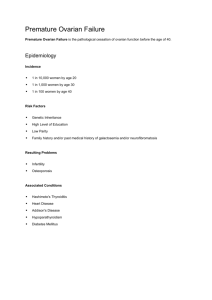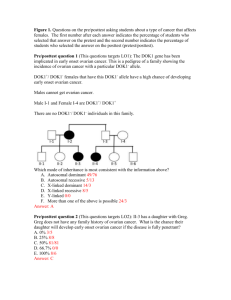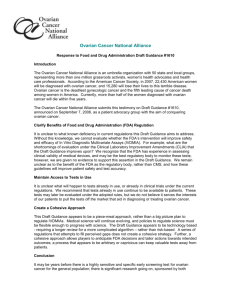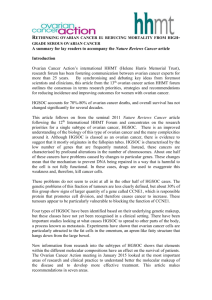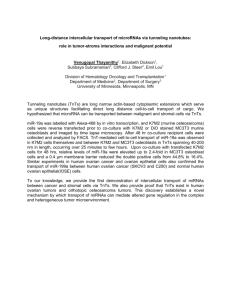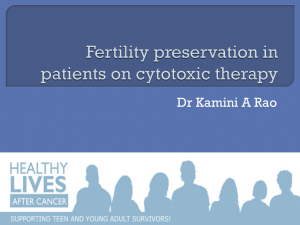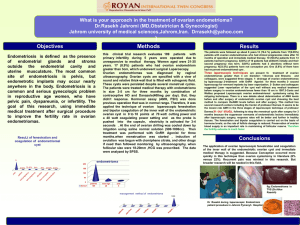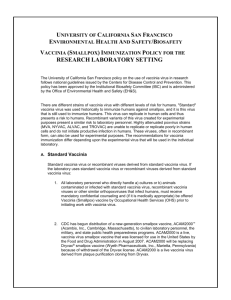Michael Way research project - The Francis Crick Institute
advertisement
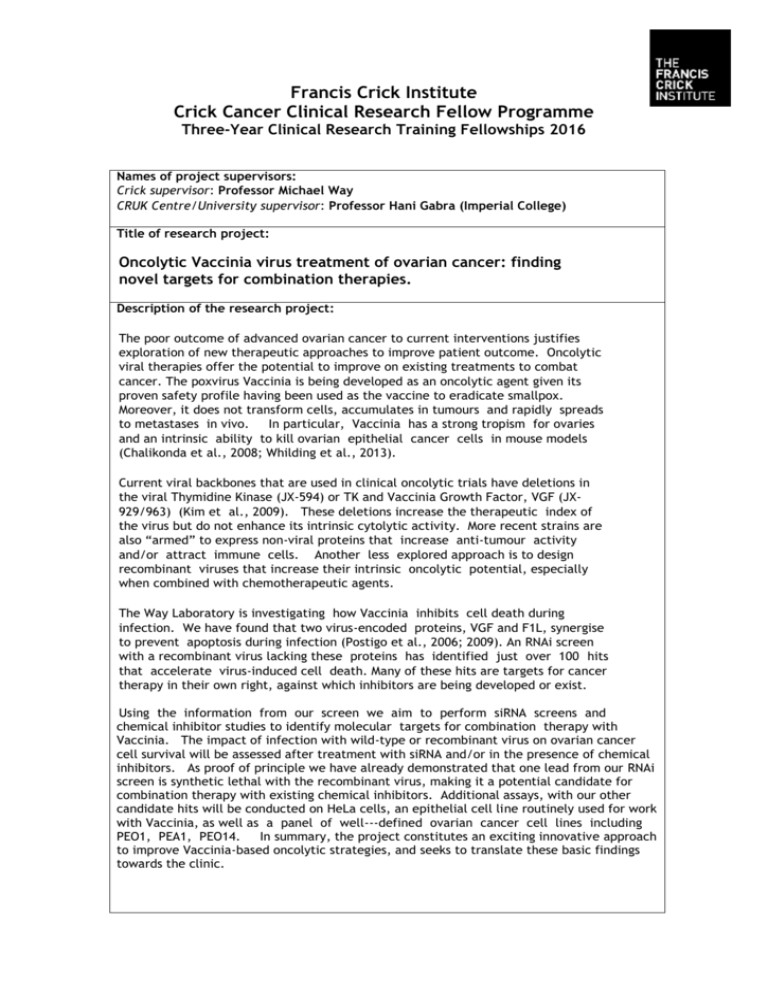
Francis Crick Institute Crick Cancer Clinical Research Fellow Programme Three-Year Clinical Research Training Fellowships 2016 Names of project supervisors: Crick supervisor: Professor Michael Way CRUK Centre/University supervisor: Professor Hani Gabra (Imperial College) Title of research project: Oncolytic Vaccinia virus treatment of ovarian cancer: finding novel targets for combination therapies. Description of the research project: The poor outcome of advanced ovarian cancer to current interventions justifies exploration of new therapeutic approaches to improve patient outcome. Oncolytic viral therapies offer the potential to improve on existing treatments to combat cancer. The poxvirus Vaccinia is being developed as an oncolytic agent given its proven safety profile having been used as the vaccine to eradicate smallpox. Moreover, it does not transform cells, accumulates in tumours and rapidly spreads to metastases in vivo. In particular, Vaccinia has a strong tropism for ovaries and an intrinsic ability to kill ovarian epithelial cancer cells in mouse models (Chalikonda et al., 2008; Whilding et al., 2013). Current viral backbones that are used in clinical oncolytic trials have deletions in the viral Thymidine Kinase (JX-594) or TK and Vaccinia Growth Factor, VGF (JX929/963) (Kim et al., 2009). These deletions increase the therapeutic index of the virus but do not enhance its intrinsic cytolytic activity. More recent strains are also “armed” to express non-viral proteins that increase anti-tumour activity and/or attract immune cells. Another less explored approach is to design recombinant viruses that increase their intrinsic oncolytic potential, especially when combined with chemotherapeutic agents. The Way Laboratory is investigating how Vaccinia inhibits cell death during infection. We have found that two virus-encoded proteins, VGF and F1L, synergise to prevent apoptosis during infection (Postigo et al., 2006; 2009). An RNAi screen with a recombinant virus lacking these proteins has identified just over 100 hits that accelerate virus-induced cell death. Many of these hits are targets for cancer therapy in their own right, against which inhibitors are being developed or exist. Using the information from our screen we aim to perform siRNA screens and chemical inhibitor studies to identify molecular targets for combination therapy with Vaccinia. The impact of infection with wild-type or recombinant virus on ovarian cancer cell survival will be assessed after treatment with siRNA and/or in the presence of chemical inhibitors. As proof of principle we have already demonstrated that one lead from our RNAi screen is synthetic lethal with the recombinant virus, making it a potential candidate for combination therapy with existing chemical inhibitors. Additional assays, with our other candidate hits will be conducted on HeLa cells, an epithelial cell line routinely used for work with Vaccinia, as well as a panel of well-­‐defined ovarian cancer cell lines including PEO1, PEA1, PEO14. In summary, the project constitutes an exciting innovative approach to improve Vaccinia-based oncolytic strategies, and seeks to translate these basic findings towards the clinic. References: 1. Chalikonda S, Kivlen MH, O'Malley ME, Eric Dong XD, McCart JA, Gorry MC, Yin XY, Brown CK, Zeh HJ 3rd, Guo ZS, Bartlett DL. (2008). Oncolytic virotherapy for ovarian carcinomatosis using a replication-selective vaccinia virus armed with a yeast cytosine deaminase gene. Cancer Gene Ther. 15:115-25. 2. Kirn DH, Thorne SH. (2009) Targeted and armed oncolytic poxviruses: a novel multimechanistic therapeutic class for cancer. Nat Rev Cancer. 9:64-71. 3. Postigo A, Cross JR, Downward J, Way M. (2006) Interaction of F1L with the BH3 domain of Bak is responsible for inhibiting Vaccinia-­‐induced apoptosis. Cell Death Differ. 13:1651-662. 4. Postigo A, Martin M, Dodding M, Way M. (2009) Vaccinia-induced EGFRMEK signaling and the anti-apoptotic protein F1L synergize to suppress cell death during infection. Cellular Microbiology. 11:1208–1218. 5. Whilding LM, Archibald KM, Kulbe H, Balkwill FR, Öberg D, McNeish IA. (2013) Vaccinia virus induces programmed necrosis in ovarian cancer cells. Mol Ther. 21:2074-2086. Summarise the medical/clinical component of the research, as well as the relevance to the Crick Cancer CRF programme: Development of Vaccinia-based oncolytic viruses has focussed on increasing their therapeutic index and enhancing immune activation by “arming” the genome with host proteins. Our approach to identify specific (and preferentially druggable) hits that synergize with a recombinant virus similar to those currently in clinical trials provides fresh avenues to target ovarian cancer. The targets we have identified through synthetic lethal approaches may also contribute to better systems oncology understanding of ovarian cancer therapies. The project provides an excellent opportunity for a clinical fellow to work on a basic science-driven project that has immediate translational applications to improving patient outcomes. Daily supervision will be provided by Dr. Antonio Postigo, a senior member of the Way lab, who has extensive experience and knowledge of Vaccinia, regulation of cell death and siRNA screens. Our collaborator Professor Hani Gabra, Deputy Head of the Division of Cancer and Director of the Ovarian Cancer Acton Research Centre at Imperial College will provide defined epithelial ovarian cancer cell lines and patient samples. The first year will focus on target definition and validation in tumour cell lines. In subsequent years, in collaboration with Professor Hani Gabra, we extend our findings to appropriate xenograph and genetically engineered mouse models of ovarian cancer and evaluate the effect of oncolytic viruses in patient--‐derived epithelial ovarian cancers in vitro. This collaborative project builds on the strengths of the partners and will provide the candidate with an excellent training in basic biology, high throughput screening, systems oncology and mouse models of ovarian cancer. Project supervisors’ contact details: Crick supervisor: Name: Professor Michael Way Telephone: 0207 2693733 Email: Michael.way@crick.ac.uk CRUK Centre / University supervisor: Name: Professor Hani Gabra Telephone: +44 20 7594 2792 Email: h.gabra@imperial.ac.uk
